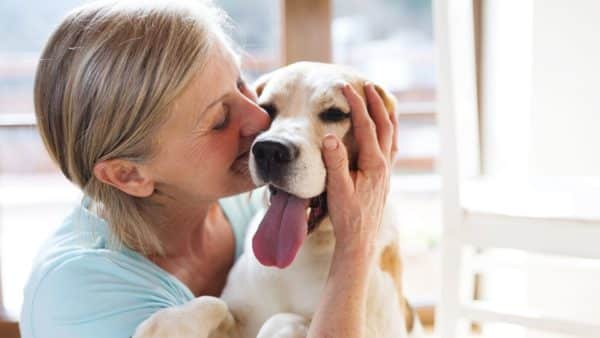


Contagious dog diseases are infectious diseases that are easily spread by the transmission of the causative agent (bacteria, virus, or fungi) from an infected dog to another dog. Take note that not all infectious diseases are contagious.
There are several ways by which contagious diseases spread from one dog to another. These include:
Elevate your dog’s overall well-being with our top picks for canine multivitamins. We’ve handpicked a range of premium supplements to support your furry friend’s health, ensuring they receive essential vitamins and minerals for a vibrant life. From chewable treats bursting with nutrients to liquid formulations that blend seamlessly into meals, our curated selection covers various preferences and dietary needs.
Canine distemper is a very contagious viral disease. It can affect dogs of all ages but unvaccinated dogs and those without regular vaccination are most at risk.
The infection can be spread by body secretions. When an infected dog coughs or sneezes, droplets that contain viral particles are released into the air and can be inhaled by susceptible dogs.
There are three main conditions associated with canine distemper— digestive problems, respiratory issues, and nervous types.
Canine distemper infections are often fatal.
The best way to protect your dog from this very contagious and deadly disease is vaccination.
The canine distemper vaccine is one of the “core” vaccines that is recommended for dogs. Make sure your pet’s canine distemper vaccination is up to date by checking with your veterinarian.
Also called “canine flu” or “dog flu”, canine influenza is caused by the influenza virus.
Infections are usually acquired from being in close proximity with infected dogs, such as in boarding kennels, shelters, and doggy daycare centers.
Respiratory secretions that contain the virus are spread through the air when an infected dog coughs and sneezes. The infection can also be acquired from contaminated objects and surfaces.
The virus can survive for up to 48 hours on surfaces, up to 24 hours on clothing, and up to 12 hours on people’s hands.
Some dogs are infected by the virus without exhibiting any symptoms of canine flu. These apparently healthy dogs can shed the virus and are called “asymptomatic carriers”.
The canine influenza vaccine is not a core vaccine. This means that your veterinarian will have to take into consideration several factors, including your dog’s risk of exposure, to determine whether there is a need to vaccinate your dog against the disease or not.
Canine parvovirus, also called “parvo”, is a very contagious viral disease. Puppies that have not received the full vaccine regimen and dogs whose vaccines are not updated are most at risk of being infected.
The virus is present in the feces of infected dogs. It is spread via the fecal/oral route. A dog can acquire the infection by being in direct contact with an infected dog or from contaminated objects and surfaces.
The infected dog’s food and water bowls, collars, leashes, blanket, toys, crate, etc. are important sources of the virus. The hands, shoes, and clothing of people are also important sources of infection.
An infected dog sheds the virus in the feces within four to five days after exposure, throughout the duration of the infection, and up to two weeks after the dog’s recovery.
The virus can survive for months in the environment. Thorough disinfection using disinfectants containing sodium hypochlorite or accelerated peroxide compounds is necessary to eliminate the virus in the dog’s immediate environment.
Treating parvovirus infection can be very expensive. However, even with aggressive treatment, the mortality rate is still high.
The virus attacks the dog’s gastrointestinal system leading to the following symptoms:
Updated parvovirus vaccination is the best protection against parvo infection. It’s one of the first vaccines that puppies receive.
The canine parvovirus vaccine is also considered a “core” vaccine, just like canine distemper. It’s recommended for every dog. Make sure to keep your dog’s vaccines up-to-date by having your pet vaccinated at specific dates provided by your veterinarian.
Kennel cough, also called canine infectious tracheobronchitis or canine infectious respiratory disease complex, is caused by a host of viruses and bacteria.
It’s a very contagious disease that can easily be spread between dogs by respiratory secretions. When an infected dog coughs and sneezes, aerosols that contain the virus are dispersed in the air and can be inhaled by a healthy dog.
Many cases of kennel cough occur after a dog spends time in close proximity with other dogs. Spending time in kennels can be stressful for dogs. Since stress can have a negative effect on the immune system function, it can render the dog more susceptible to health issues, like kennel cough.
Kennels, dogs shows, or dog parks are just some places where your dog can get kennel cough after playing and interacting with other dogs that may be carrying the causative agent.
In the early stages of the infection, affected dogs may not show any signs of illness but they are already shedding the virus that can infect other dogs.
Kennel cough usually resolves on its own without medical intervention. However, life-threatening pneumonia can develop in dogs with compromised immune systems.
There is a vaccine for kennel cough but it’s not a core vaccine. Consult your veterinarian whether your dog needs it or not.

Leptospirosis is an infection that is caused by bacterial species known as Leptospira. It can affect dogs, cats, farm animals, and even people. ‘
The bacteria are shed in the urine of infected animals which then contaminates food, water, or soil. Infection can be acquired through the oral route -ingesting contaminated food and water or coming into contact with contaminated soil or objects.
Early diagnosis and treatment can greatly improve a dog’s chances of recovery.
Vaccination is the best way to protect your pet dog from Leptospirosis. After considering several important factors, your veterinarian will determine if a leptospirosis vaccine is appropriate for your dog. Some vaccines combine canine distemper, parvovirus, hepatitis, and leptospirosis which is given as a single shot.
Rabies is caused by a virus that can infect any mammal, including humans. Rabies vaccination is mandatory. In fact, there are laws that require the vaccination of dogs. Proof of rabies vaccination is usually required in dog parks, kennels, when traveling with pets, etc.
Rabies is highly contagious and 100% fatal when clinical symptoms are already manifested.
The virus is primarily spread through saliva. An infected dog can transmit rabies by biting another dog or contaminating a skin wound with saliva.
Contact with wildlife can increase a dog’s risk of rabies infection. Bats, raccoons, skunks, and other wild mammals are considered important reservoirs of the virus.
Ringworm is not caused by a worm. It is actually a highly contagious fungal infection that is characterized by a ring-like patch of hair loss, thus the name.
The skin problem is more often seen in puppies whose immune system is still developing and in older dogs with health issues. It’s not as common in healthy dogs.
Signs of infection typically appear one to three weeks after being exposed to the fungus.
Dogs can get ringworm from being in close contact with infected dogs, as well as from contaminated bedding and other objects that the infected dog has come in contact with. Cases of ringworm are common in shelter settings.
Ringworm is very contagious that even if only one dog is showing signs of infection, other pets in the household are also assumed to be carrying the infection and are also treated. It’s also a zoonotic infection, which means it can be transmitted from pets to humans.
The fungus produces spores that can survive in the environment for a long time. Get rid of fungal spores in your pet’s environment using diluted bleach. All your pet’s things and places where he usually stays should be disinfected.
Ringworm infection tends to resolve on its own without treatment. But treatment is recommended to prevent spreading the infection to other pets or to people. Antifungal medication and medicated shampoos can help hasten recovery.

Coronavirus infection in dogs can be manifested as a digestive disorder (canine enteric coronavirus) or a respiratory infection (canine respiratory coronavirus). A more virulent form called the pantropic canine coronavirus causes severe gastrointestinal tract symptoms and can affect other vital organs of the body.
Canine coronavirus is not the same as the severe acute respiratory syndrome coronavirus 2 (SARS-CoV-2), the virus that is causing today’s pandemic, coronavirus disease 2019 ( COVID-19 ).
The virus can be transmitted between dogs through coughing and sneezing. Disinfection of your dog’s immediate environment using 70% isopropyl alcohol, diluted bleach, or 0.5% hydrogen peroxide can inactivate the virus. Take note, however, that these disinfectants are used on surfaces and not on pets.
In healthy dogs, the infection is relatively mild. Most recover within eight to 10 days with symptomatic and supportive treatment. Puppies and dogs with certain health issues may become very ill.
A canine coronavirus vaccine is available but it’s not considered a core vaccination. The vaccine does not protect dogs from the more virulent pantropic canine coronavirus.
Canine herpesvirus (CHV) can affect dogs of any age by the infection is more severe in puppies which sees the highest mortality rate.
Most cases of CHV in older dogs are relatively mild. Some might have a mild fever or respiratory issue, except in dogs with a pre-existing health issue or those with compromised immune system function.
There is a vaccine for CHV but it will be up to your veterinarian to determine whether it’s appropriate for your pet or not.
There are also measures that you can undertake to protect puppies from CHV. Newborn puppies must be kept warm as their body’s thermoregulatory mechanism is still developing. Without an external heat source, the body temperature of puppies could go down making them susceptible to infection.
Canine hepatitis is a viral infection that can cause inflammation of the liver. It can also affect other vital organs.
The most common way by which dogs can be infected with canine hepatitis is through the oral route– by ingestion of contaminated body secretions of infected dogs.
Puppies are most susceptible to the infection because their immune system has not yet fully developed. Mortality from canine hepatitis is highest in very young dogs.
If a dog recovers from the disease, shedding of the virus through the urine can extend for about six months.
Vaccination is the best way to protect your pet from canine hepatitis and other dangerous diseases. While some of the diseases will be eliminated with core vaccines, there are some that do not require a vaccine.
Talk to your vet and get the ones that your dog needs, regardless if it’s mandatory or not. Don’t take a chance at their health.
Most of us train our dogs when they are puppies to jump up on furniture. We think it’s harmless (and easier than always lifting them), but for dogs, couches and beds are very high compared to the size of their bodies.
Every time they jump it compresses their back and applies enormous force to their joints.
It’s no wonder that an incredible 80% of dogs experience arthritis or joint pain by only 7 years old.
Luckily, there is a vet-recommended solution.
It’s the PawRamp by Alpha Paw. An adjustable ramp that allows dogs to safely get on and off couches and beds. PawRamp makes joining you in bed or on the couch effortless and fun.
As a bonus, you can use code SAVE35 to get $35 off the PawRamp today.

The medical, nutritional, or behavioral advice we provide is intended for informational and educational purposes only. Our editorial content is not a substitute for formal or personalized medical advice from a veterinary professional. Only board-certified veterinary specialists who have examined your pet should diagnose medical conditions, provide personalized treatment, or prescribe appropriate medication. For questions regarding your pet’s health, or if your pet is exhibiting signs of illness, injury, or distress, contact your veterinarian immediately. Never disregard professional medical advice or delay in seeking it because of something you have read on our site.